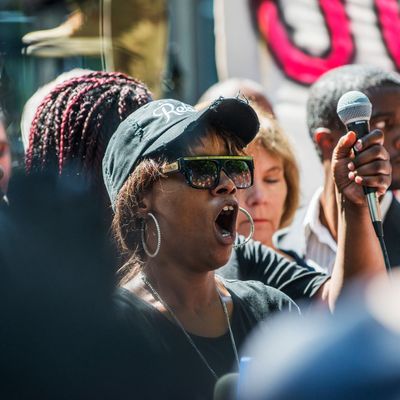
There is a group of people in America — it is predominantly composed of white people — that wants Latino immigrants kicked out of the country. They attempt to create fear surrounding Muslims. They don’t want women to have reproductive rights. They don’t treat transgender citizens like humans. They throw around anti-Semitism with ease. And they don’t have a problem when police kill black people.
And the ferment stirred up by this ideology, white supremacy, is spreading. In one week, we watched two black men — Alton Sterling and Philando Castile — killed by police officers*, followed by a black man in Dallas killing five police officers. All of these acts are indefensible, all products of a climate founded in fear and distrust, one that has become violent, and now, vengeful.
What is to be done? The need for a coordinated movement to resist such hatred is clear, but it can’t simply be composed of minorities. There’s one more group that must be involved: the white people who need to help.
In The Autobiography of Malcolm X, Malcolm described an interaction in which a white woman came from New England to New York to ask his advice on what she should do to be an effective ally. The scene was portrayed in Spike Lee’s movie Malcolm X.
Malcolm’s answer to her plea of “What can I do to help further your cause?” was this: “Nothing.”
In part because of the film, many people of color now think the way to deal with white allies should be the same as Malcolm’s — tell them to just get out of the way. One of our most time-honored ways of dealing with a lifetime of pain from white people is to publicly drag them, our own little form of daily reparations. Every day is an exercise in grading the next “woke” white person — which, aside from often being justified on the merits, is also a way to keep white people uncomfortable, so they’ll never know if what they are doing is right or wrong, even if they actually have good intentions. Plus, white people should know what it’s like to feel uncomfortable, since it’s par for the course for everyone else.
But even the most off-putting Instagram photo of Mischa Barton on a fancy boat looking concerned about police brutality isn’t the enemy. And Malcolm, whose life arc was that of reinvention and self-improvement, admitted in a later chapter of his book that he regretted what he said to the white lady who wanted to help. “I knew, better than most Negroes, how many white people truly wanted to see American racial problems solved,” Malcolm wrote. “I knew that many whites were as frustrated as Negroes.” But his shift was not a 180-degree flip. He was still wary of white people who wanted to ally as “an escapist way to salve their consciences.” Ultimately, he came to the conclusion that white people can advance the cause of black people, but it has to be done in a particular way:
By visibly hovering near us, they are “proving” that they are “with us.” But the hard truth is this isn’t helping to solve America’s racist problem. The Negroes aren’t the racists. Where the really sincere white people have got to do their “proving” of themselves is not among the black victims, but out on the battle lines of where America’s racism really is — and that’s in their own home communities; America’s racism is among their own fellow whites. That’s where sincere whites who really mean to accomplish something have got to work.
Malcolm said this in 1964, but it could have been written to describe July 2016.
The past year, and the rise of Trump, has brought bigotry out of hiding, and thank God for it — at least there’s no escaping what we’re dealing with now. The election of Obama sparked a racist backlash that has now fully flowered into a political campaign explicitly centered around the idea of taking America back for white people. Online, on television, and in real life, we are living in their coming-out party. And they have no reason to hide, because there seem to be no penalties or repercussions for hatred.
Highlighting the hate, and the haters, was supposed to do the trick. There was a point when applying scarlet letters would strip someone of the ability to have a platform, driving them back underground. That’s no longer the case, and now the back-and-forth shaming makes people louder, further expanding the poles that are our two Americas.
The rules have changed, so the tactics also have to change. It’s no longer just about speaking out. White people have to internally change the structures that promote bigotry, from organizations to law enforcement to political parties, while minority groups have to protect themselves and make sure that trauma doesn’t lead to irreversible acts that cause more trauma.
Minorities are fighting for their lives. This group that wants to take America back enjoys watching the rest of us crack, publicly stumble, all while using one negative example to prove a point and judge an entire group. They want us to feel pain, and they want many of us to disappear. You hear it in Trump’s speeches, you see it at his rallies, you can’t escape it on social media, and you feel it every time an officer turns another black man into a hashtag with the pull of a trigger. These people don’t want us to win, and some don’t want us to live. So all we have is each other. And as Malcolm said, “in our mutual sincerity we might be able to show a road to the salvation of America’s very soul.”
*This story originally identified all the officers involved in the shootings as white.





























